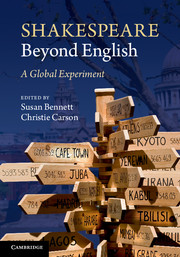Book contents
- Frontmatter
- Contents
- List of Illustrations
- List of colour plates
- Notes on contributors
- Foreword
- Acknowledgements
- Introduction
- The Globe to Globe Festival: An Introduction
- Performance Calendar
- Week One
- Week Two
- Week Three
- Chapter Seventeen Power play
- Chapter Eighteen Locating Makbet/Locating the Spectator
- Chapter Nineteen ‘Who dares receive it other’
- Chapter Twenty Two Gentlemen of Verona for/by Zimbabwean Diasporic Communities
- Chapter Twenty-One Inter-theatrical Reading
- Chapter Twenty-Two ‘This is our modern history’
- Week Four
- Week Five
- Week Six
- Afterwords
- Index
- Plate section
Chapter Twenty - Two Gentlemen of Verona for/by Zimbabwean Diasporic Communities
Published online by Cambridge University Press: 05 June 2014
- Frontmatter
- Contents
- List of Illustrations
- List of colour plates
- Notes on contributors
- Foreword
- Acknowledgements
- Introduction
- The Globe to Globe Festival: An Introduction
- Performance Calendar
- Week One
- Week Two
- Week Three
- Chapter Seventeen Power play
- Chapter Eighteen Locating Makbet/Locating the Spectator
- Chapter Nineteen ‘Who dares receive it other’
- Chapter Twenty Two Gentlemen of Verona for/by Zimbabwean Diasporic Communities
- Chapter Twenty-One Inter-theatrical Reading
- Chapter Twenty-Two ‘This is our modern history’
- Week Four
- Week Five
- Week Six
- Afterwords
- Index
- Plate section
Summary
This production of The Two Gentlemen of Verona pre-existed the Globe to Globe Festival, having been first staged in London (at the Oval House Theatre in November 2008) and then in other venues across the UK and overseas, including, most crucially, at HIFA (the Harare International Festival of Theatre) in 2009, as well as in high-density suburbs in Harare. Denton Chikura and Tonderai Munyevu, the two actors playing fifteen roles between them, including Crab the dog, moved to London from Zimbabwe just over ten years ago, while Arne Pohlmeier, the German-born director and co-founder of Two Gents Productions, was raised in Cameroon and lived in South Africa before settling in London. The personal backgrounds and the self-consciously intercultural mission statement that informs the work of this extraordinarily talented young company have had a palpable impact on their magnificent reworking of The Two Gentlemen of Verona, which opened as part of the Globe to Globe Festival on 9 May. Within seconds of entering the stage via its trap-door, Chikura and Munyevu had gripped the audience's attention through their unique style, which draws from South African township theatre as much as from Shakespeare, to offer a phenomenally entertaining, fast-paced version of Shakespeare's early comedy.
By the time it opened at the Globe to Globe Festival, this production had changed in some obvious and in some more subtle ways. Generally speaking, as director Pohlmeier explained when I asked him how he would define his approach to this play, the work he had done with Chikura and Munyevu to adapt their production to the Globe stage still relied primarily on the conventions first used in Woza Albert!, which has become the best-known example of South African township theatre worldwide since its première at the Market Theatre in Johannesburg in 1981. Pohlmeier added that Bertolt Brecht and the Berliner Ensemble had also had a considerable influence on South African theatre in the second half of the twentieth century, either directly, as their work became renowned internationally, or via other theatre artists and practitioners, including Peter Brook, who favoured a presentational over a representational approach to theatre-making.
- Type
- Chapter
- Information
- Shakespeare beyond EnglishA Global Experiment, pp. 157 - 160Publisher: Cambridge University PressPrint publication year: 2013

